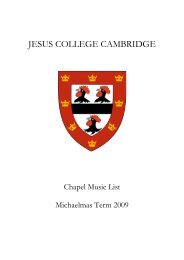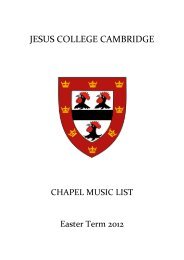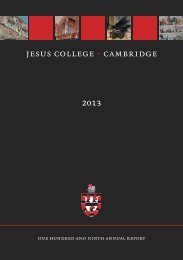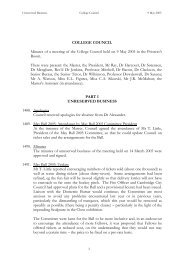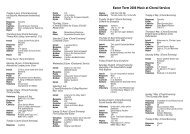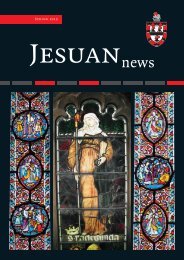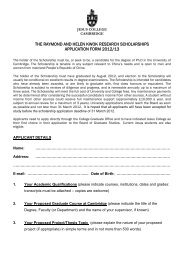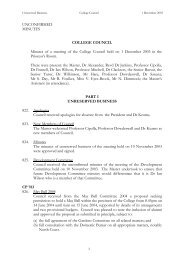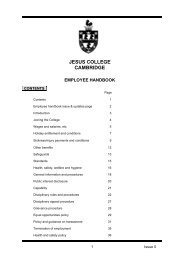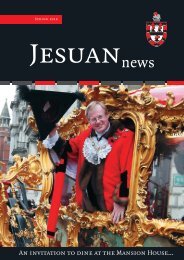2012 Annual Report - Jesus College - University of Cambridge
2012 Annual Report - Jesus College - University of Cambridge
2012 Annual Report - Jesus College - University of Cambridge
Create successful ePaper yourself
Turn your PDF publications into a flip-book with our unique Google optimized e-Paper software.
56 CREATOR OF THE MODERN COLLEGE I <strong>Jesus</strong> <strong>College</strong> <strong>Annual</strong> <strong>Report</strong> <strong>2012</strong><br />
Morgan’s Tutorship (1864-1870) the<br />
number fell slightly to 6 out <strong>of</strong> 8 (150 out<br />
<strong>of</strong> 202) which was about the <strong>University</strong><br />
average. But in the next fourteen, during its<br />
full-flowering, only 5 in 9 graduated (495<br />
out <strong>of</strong> 906) whereas the <strong>University</strong>’s<br />
average was 7 in 9. And, unsurprisingly,<br />
there was little change during the ten years<br />
<strong>of</strong> ‘Red’ Morgan’s Tutorship (1886 – 1895):<br />
only 3 in 5 graduated, while the <strong>University</strong><br />
average was 4 in 5. Not all <strong>of</strong> those who did<br />
not graduate will have stayed as long as<br />
those who did, so they will not, term by<br />
term, have been quite so large a proportion<br />
<strong>of</strong> the student body as those bare statistics<br />
suggest. But all a student had to do if he<br />
was to stay beyond his first year was pass<br />
the Previous (‘Little Go’) examination, and<br />
as the 1874 edition <strong>of</strong> the semi-<strong>of</strong>ficial<br />
Student’s Guide to the <strong>University</strong> <strong>of</strong> <strong>Cambridge</strong><br />
said, “being intended for all students alike,<br />
and being placed early in the course, is<br />
necessarily easy. The standard is low . . . .<br />
students <strong>of</strong>ten leave school with<br />
knowledge sufficient to pass the<br />
examination, [so] it has been thought<br />
expedient to allow such students to pass<br />
the examination” early in their first year. 22<br />
But it was not only the ratio <strong>of</strong> graduating<br />
to matriculating students that was low during<br />
Morgan’s Tutorship; so too was the<br />
proportion taking an Honours rather than an<br />
Ordinary degree – “the examination for<br />
which” as that same edition <strong>of</strong> The Student’s<br />
Guide assured its readers “is in truth not so<br />
difficult but that any person <strong>of</strong> common<br />
abilities, and common preliminary training,<br />
with tolerable industry at <strong>Cambridge</strong>, may<br />
reckon with certainty upon passing it.” 23<br />
In the years 1850-1863 1 in every 2 <strong>Jesus</strong><br />
graduates obtained Honours, but throughout<br />
Morgan’s Tutorship only about 1 in 4 did (it’s<br />
difficult to be more precise since the able and<br />
ambitious <strong>of</strong>ten took more than one Tripos):<br />
an average <strong>of</strong> 6 a year between 1864 and 1870,<br />
but no more than 9 a year 1871-1885, despite<br />
the great growth in the <strong>College</strong>’s size, which<br />
was not matched, either, by a significant rise<br />
in the number <strong>of</strong> scholarships <strong>of</strong>fered.<br />
Seventeen instead <strong>of</strong> 14 Rustat Scholarships<br />
were now available (and no longer limited to<br />
clergy orphans), and there were two Entrance<br />
scholarships – a novelty – each year, one in<br />
Mathematics and one in Classics. That was<br />
all. The <strong>College</strong> had not yet started to <strong>of</strong>fer<br />
teaching for the Tripos: those seeking<br />
Honours - the “reading man” – had still to<br />
go and find it for themselves. 24 The <strong>College</strong><br />
provided only what was needed for the<br />
Ordinary examinations. (In 1868 <strong>Jesus</strong> had<br />
agreed with four others on inter-collegiate<br />
lectures for the Classical Tripos, each college<br />
to provide a lecturer on a different subject,<br />
but the scheme was not trouble-free. 25 ) As The<br />
Student’s Guide (speaking <strong>of</strong> the run <strong>of</strong><br />
colleges) said, “Perhaps two hours a day may<br />
be the average <strong>of</strong> time exacted <strong>of</strong> a student by<br />
the lecturer. Nor is it to be imagined that by<br />
a lecture is meant a formal and continuous<br />
discourse. . . A lecture at <strong>Cambridge</strong> is<br />
generally much the same thing as a lesson at<br />
school, it being <strong>of</strong> course understood that the<br />
lectured are not subject to the restraints and<br />
discipline <strong>of</strong> schoolboys. If the subject be<br />
classical, an author is read, the students<br />
translating in turns, while the lecturer<br />
interposes his comments as he sees fit. If it<br />
be mathematical, the students are <strong>of</strong>ten<br />
occupied during the whole <strong>of</strong> the hour in<br />
writing answers to written questions or in<br />
solving problems. Where the audience is<br />
large, the lecture sometimes becomes more<br />
formal in its character.” 26<br />
Matters improved somewhat during ‘Red’<br />
Morgan’s Tutorship: 1 in 3 <strong>Jesus</strong><br />
undergraduates now took Honours – over<br />
half <strong>of</strong> them in one <strong>of</strong> the “new” Triposes :<br />
Natural and Mechanical Sciences, Law,<br />
History, Economics and Theology. It was not,<br />
however, until Arthur Gray became Senior<br />
Tutor in 1895 (the first layman to be a <strong>Jesus</strong><br />
Tutor) that there was any real change –<br />
Fellows to teach something other than<br />
Mathematics and Classics began to be<br />
elected, but it was an uphill struggle in the<br />
hard times <strong>of</strong> the agricultural depression and<br />
the South African war (for which Morgan was<br />
a fervently jingoistic recruiting sergeant) 27<br />
when colleges were competing for a<br />
dwindling number <strong>of</strong> students. Indeed, it was<br />
only under the impact <strong>of</strong> the 1944 Education<br />
Act that the present understanding that a<br />
student place at <strong>Cambridge</strong> is a scarce and



